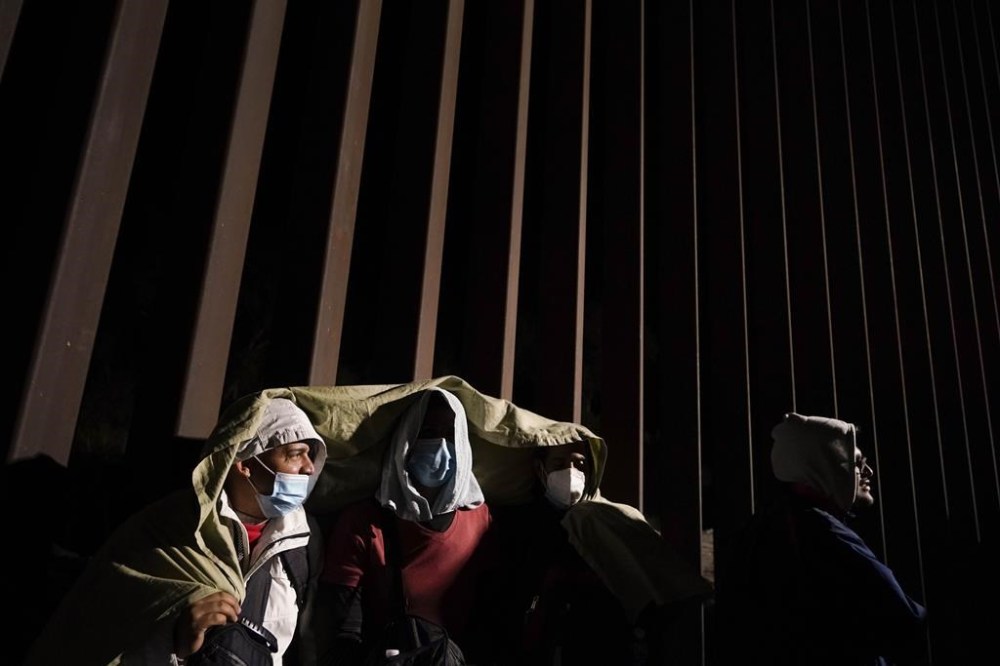Judge delays end of asylum restrictions to late December
Advertisement
Read this article for free:
or
Already have an account? Log in here »
To continue reading, please subscribe:
Monthly Digital Subscription
$0 for the first 4 weeks*
- Enjoy unlimited reading on winnipegfreepress.com
- Read the E-Edition, our digital replica newspaper
- Access News Break, our award-winning app
- Play interactive puzzles
*No charge for 4 weeks then price increases to the regular rate of $19.00 plus GST every four weeks. Offer available to new and qualified returning subscribers only. Cancel any time.
Monthly Digital Subscription
$4.75/week*
- Enjoy unlimited reading on winnipegfreepress.com
- Read the E-Edition, our digital replica newspaper
- Access News Break, our award-winning app
- Play interactive puzzles
*Billed as $19 plus GST every four weeks. Cancel any time.
To continue reading, please subscribe:
Add Free Press access to your Brandon Sun subscription for only an additional
$1 for the first 4 weeks*
*Your next subscription payment will increase by $1.00 and you will be charged $16.99 plus GST for four weeks. After four weeks, your payment will increase to $23.99 plus GST every four weeks.
Read unlimited articles for free today:
or
Already have an account? Log in here »
Hey there, time traveller!
This article was published 16/11/2022 (1132 days ago), so information in it may no longer be current.
SAN DIEGO (AP) — A federal judge on Wednesday granted the Biden administration a five-week delay to end far-reaching asylum restrictions, writing in upper-case letters that he was doing so “WITH GREAT RELUCTANCE.”
U.S. District Judge Emmet Sullivan acknowledged in his brief order that attorneys for asylum-seeking families didn’t object to the delay and that the administration wasn’t challenging his decision, just asking for time to prepare.
The Trump-era policy denying migrants rights under U.S. and international law to request asylum on public-health grounds of preventing spread of COVID-19 is now set to end Dec. 21.

Sullivan ruled in Washington on Tuesday that enforcement must end immediately for families and single adults, calling the ban “arbitrary and capricious.” The administration has not applied it to children traveling alone.
Within hours, the Justice Department asked the judge to let the order take effect Dec. 21, giving it five weeks to prepare. Plaintiffs including the American Civil Liberties Union didn’t oppose the delay.
“This transition period is critical to ensuring that (the Department of Homeland Security) can continue to carry out its mission to secure the Nation’s borders and to conduct its border operations in an orderly fashion,” government attorneys wrote.
Sullivan, who was appointed by President Bill Clinton, wrote in a 49-page ruling that authorities failed to consider the impact on migrants and possible alternatives.
The ruling appears to conflict with another in May by a federal judge in Louisiana that kept the restrictions. ACLU attorney Lee Gelernt said Sullivan’s order renders the Louisiana ruling moot.
If Sullivan’s ruling stands, it would upend border enforcement. Migrants have been expelled from the United States more than 2.4 million times since the rule took effect in March 2020.
The practice was authorized under Title 42 of a broader 1944 law covering public health.
Before the judge in Louisiana kept the ban in place in May, U.S. officials said they were planning for as many as 18,000 migrants a day under the most challenging scenario, a staggering number. In May, migrants were stopped an average of 7,800 times a day, the highest of Joe Biden’s presidency.
Immigration advocacy groups have pressed hard to end Title 42, but more moderate Democrats, including U.S. Sens. Mark Kelly of Arizona and Raphael Warnock of Georgia, wanted it to stay when the administration tried to lift it in May.
The ban has been unevenly enforced by nationality, falling largely on migrants from Guatemala, Honduras and El Salvador — in addition to Mexicans — because Mexico allows them to be returned from the United States. Last month, Mexico began accepting Venezuelans who are expelled from the United States under Title 42, causing a sharp drop in Venezuelans seeking asylum at the U.S. border.
Nationalities that are less likely to be subject to Title 42 have become a growing presence at the border, confident they will be released in the United States to pursue their immigration cases. In October, Cubans were the second-largest nationality at the border after Mexicans, followed by Venezuelans and Nicaraguans.
The Homeland Security Department said Wednesday that it would use the next five weeks to “prepare for an orderly transition to new policies at the border.”
“We continue to work with countries throughout the Western Hemisphere to take enforcement actions against the smuggling networks that entice migrants to take the dangerous and often deadly journey to our land borders and to address the root causes of irregular migration that are challenging our hemisphere as a whole,” the department said.


